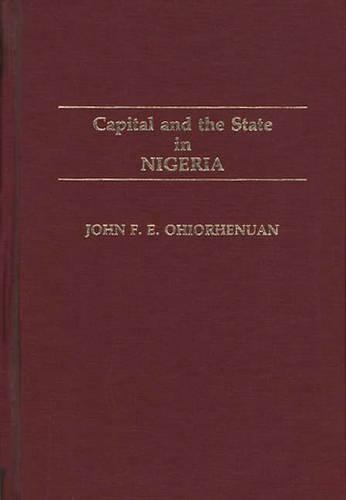
Capital and the State in Nigeria
(Hardback)
Publishing Details
Capital and the State in Nigeria
By (Author) John Ohiorhenuan
Bloomsbury Publishing PLC
Praeger Publishers Inc
23rd August 1989
United States
Classifications
Tertiary Education
Non Fiction
Microeconomics
332.04109669
Physical Properties
Hardback
280
Width 156mm, Height 235mm
624g
Description
Since achieving independence in 1960, Nigeria has suffered through a civil war, the overthrow of elected governments in repeated military coups, and severe economic crises. This study looks at the country's economic development under these conditions and in light of Nigeria's status as a Third World nation with an economy largely dependent on foreign capital and international markets. Focusing on state economic policy, Ohiorhenuan assesses Nigeria's development as a dependent capitalist economy under military rule and identifies both the factors that promote this type of development and those that constrain it. After describing the country's current economic state, Ohiorhenuan discusses the relationship between economic dependency and capitalist development in Nigeria and then considers the economic policies of successive military regimes. Specific topics include the military's capital accumulation program and management of the economy, the restructuring of property rights, the critical role of Nigeria's oil surplus, and the government's attempts to control the organized working class. In a study of two types of collaboration between the state and transnational capital, Ohiorhenuan explores the limitations on direct governmental accumulation of capital. This systematic and incisive examination of Nigeria's political economy is a significant contribution to the understanding of Third World development processes. This book is a useful resource for policy research, studies or classes dealing with modern Africa, with Third World development, and international political economy.
Reviews
Analyzes the process of capitalist development in Nigeria over the past two decades under military rule. Describes the form of capitalism in Nigeria and considers Nigerian dependence on foreign capital and technology. Examines the military government's capital accumulation program, its restructuring of property rights, and macroeconomic policies. Nigeria's trade relationships and the role of oil surpluses in Nigerian development are also studied. Ohiorhenuan is a senior lecturer in the Department of Economics at the University of Ibadan, Nigeria.-Economic Books Current Selections
"Analyzes the process of capitalist development in Nigeria over the past two decades under military rule. Describes the form of capitalism in Nigeria and considers Nigerian dependence on foreign capital and technology. Examines the military government's capital accumulation program, its restructuring of property rights, and macroeconomic policies. Nigeria's trade relationships and the role of oil surpluses in Nigerian development are also studied. Ohiorhenuan is a senior lecturer in the Department of Economics at the University of Ibadan, Nigeria."-Economic Books Current Selections
Author Bio
JOHN F.E. OHIORHENUAN is Senior Lecturer in the Department of Economics at the University of Ibadan in Nigeria. He has published extensively in the fields of political economy, development economics and planning. Ohiorhenuan has taught at the University of Guyana and has been a Visiting Fellow at the Institute of Development Studies at the University of Sussex. He has also been Director of Planning in the Plans Programmes and Budget Department of Lagos State, Nigeria.
